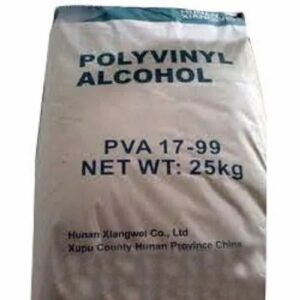Polyvinyl Alcohol (PVA) – Product Description and Uses
Product Description
Polyvinyl Alcohol (PVA) is a synthetic polymer that is water-soluble and biodegradable. It is produced by the hydrolysis of polyvinyl acetate and is known for its excellent film-forming, emulsifying, and adhesive properties. PVA is a white, odorless powder or granule that is non-toxic and environmentally friendly, making it suitable for a wide range of applications across various industries.
Uses
Polyvinyl Alcohol is utilized in numerous applications, including but not limited to:
- Adhesives: Used in the formulation of water-based adhesives for paper, wood, and textiles.
- Textiles: Acts as a sizing agent in the textile industry to improve the strength and finish of fabrics.
- Paper Coatings: Enhances the surface properties of paper, providing better printability and gloss.
- Films: Used to create biodegradable films for packaging and agricultural applications.
- Cosmetics: Serves as a film-forming agent in various cosmetic products.
- Pharmaceuticals: Employed in drug delivery systems and as a binder in tablet formulations.
- Construction: Used in cement and mortar formulations to improve adhesion and flexibility.
Technical Data
| Property | Value |
|---|---|
| Chemical Formula | (C2H4O)n |
| Molecular Weight | Varies (typically 44,000 – 186,000 g/mol) |
| Appearance | White powder or granules |
| Solubility | Soluble in water |
| Density | 1.19 – 1.31 g/cm³ |
| Melting Point | 230 – 260 °C |
| Glass Transition Temperature | 60 – 80 °C |
| pH (1% solution) | 4.5 – 6.5 |
| Viscosity (1% solution) | 10 – 100 mPa·s |
| Biodegradability | Yes |
Key Features
- Non-toxic: Safe for use in food and pharmaceutical applications.
- Biodegradable: Environmentally friendly alternative to traditional plastics.
- Versatile: Can be modified for various applications by adjusting its molecular weight and degree of hydrolysis.
Conclusion
Polyvinyl Alcohol is a versatile and eco-friendly polymer with a wide range of applications across multiple industries. Its unique properties make it an essential ingredient in products ranging from adhesives to biodegradable films, contributing to sustainable practices in manufacturing and packaging.

